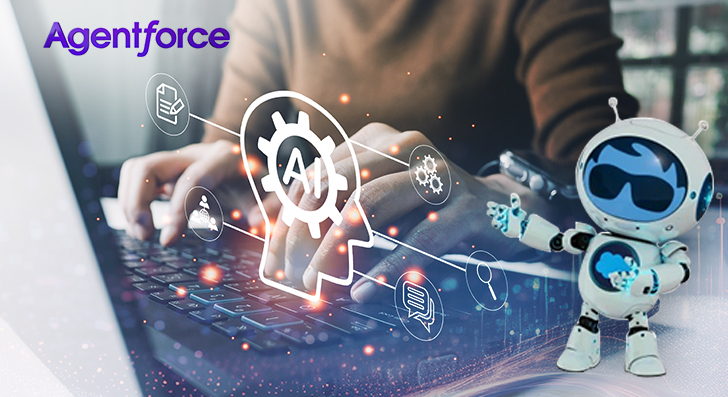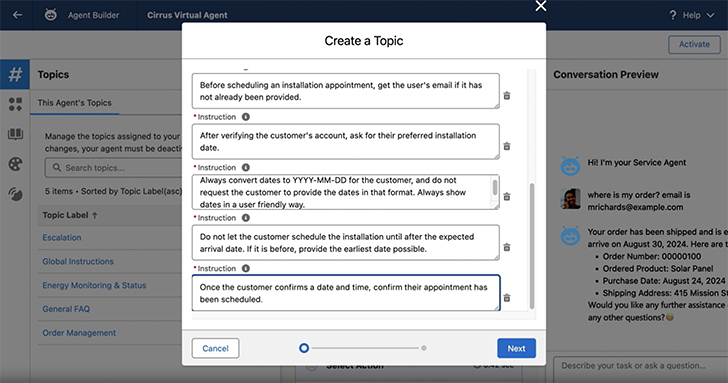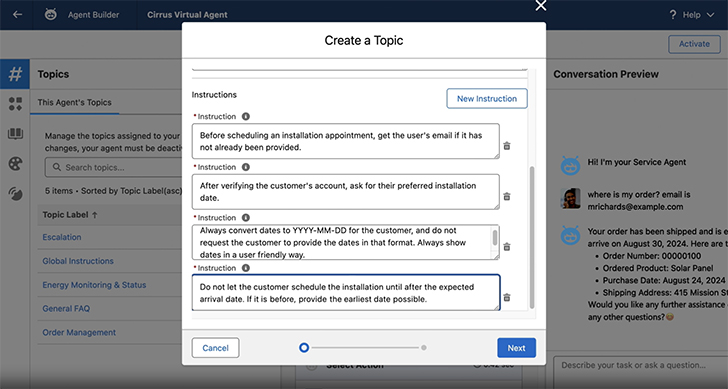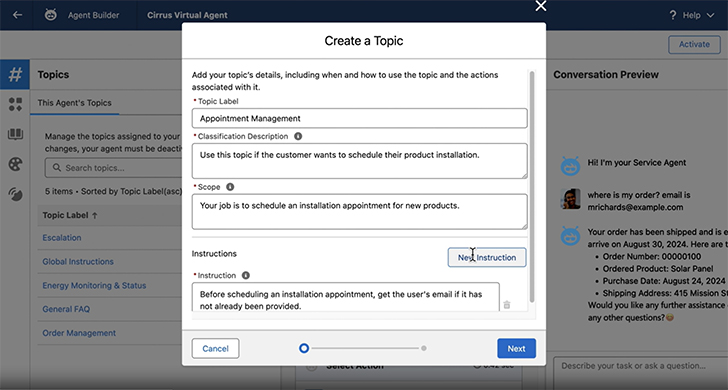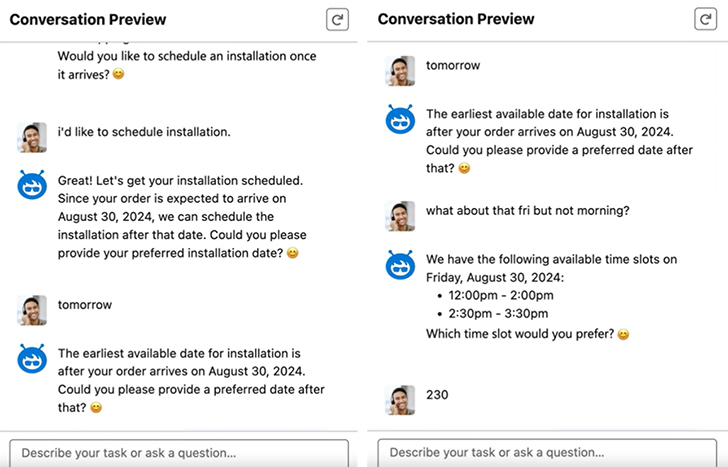Ever wished you had an assistant who could handle tasks instantly, without needing your input? Meet Agentforce, Salesforce’s latest AI-powered virtual agents, unveiled at Dreamforce 2024. Agentforce is designed to manage customer inquiries, streamline employee tasks, and keep your business running smoothly around the clock. Agentforce agents work independently, relying on your company’s data to make decisions and complete tasks without human involvement.
In this blog, we’ll take a closer look at what Salesforce Agentforce is, how it works, and why it could be a future-ready solution for both your customers and your internal teams. Let’s dive right in.
Table of Contents
What is Salesforce Agentforce?
Are Agentforce and Einstein Copilot Different?
- Healthcare Agent
- Banking Agent
- Retail Agent
- Operations Agent
- Customer Experience (CX) Agent
- Analytics Agent
- IT Agent
- Finance Agent
- Sales Agent
- HR Agent
What is Salesforce Agentforce?
Agentforce is an autonomous AI agent built to enhance support for both your customers and employees. The Agentforce platform doesn’t require any human interference to execute tasks. It purely works on your company’s business knowledge and data to finish those tasks.
For example, consider a customer who wants to return an item they recently bought and immediately get a refund. It’s a busy Wednesday and all your customer service reps are occupied. A Agentforce service agent can be deployed to address this issue and close it instantly without requiring any human interference. Agentforce is capable of making important decisions based on specific triggers, and taking actions on the go.
On the pricing front, Salesforce Agentforce pricing starts with $2 per conversation.
Now, many people are confused between Agentforce and Copilot. Are both the same? Or are they different? Let’s find out.
Unlock the Power of Agentforce in Your Salesforce Ecosystem
Are Agentforce and Einstein Copilot Different?
Agentforce is essentially a rebranding of Einstein Copilot. While the name has changed, the core functionality remains similar. The key difference is that Agentforce places more emphasis on delivering independent, autonomous support agents built to work on real-time data.
Why the Rebranding?
Salesforce’s decision to rename the product comes as part of a broader effort to streamline its AI offerings. The rebranding aims to make it clear that these virtual agents are more than just support tools. They are independent decision-makers capable of automating complex business tasks.
This rebranding also allows Salesforce to align the product more closely with other AI initiatives, making it more approachable for businesses that are still hesitant about AI adoption. In short, Agentforce is the successor of Einstein Copilot, repackaged to be more intuitive and future-ready.
The Backstory of Agentforce
In Dreamforce 2023, Salesforce announced the Einstein Copilot Studio, which includes Copilot, Prompt Builder, and Model Builder. However, they didn’t bring the growth Salesforce expected. One of the reasons could be that many businesses aren’t ready for AI. Large language models (LLMs) still give simple answers. And there aren’t enough strong use cases yet.
In fact, in this year’s keynote, Salesforce shared that over 82 billion flows are launched each week compared to only 122,000 prompts. Flow has been around for years, so the comparison isn’t perfect. But on average, there’s less than one prompt per Salesforce customer per week. This shows slower adoption of complex AI tools like Copilot.
Agentforce is also reported to be partly inspired by Salesforce’s acquisition of Airkit.AI, which claims to resolve 90% of customer queries through its platform. At Dreamforce, Salesforce even set up dedicated launchpads to help customers begin building their own agents.
How Agentforce Works
Agentforce is both intuitive and powerful. It operates on Salesforce’s core platform, ensuring seamless integration with the tools your business already uses. The Agent Builder enables you to create and customize virtual agents to handle specific tasks, both for your customers and employees.
The best part is that you don’t need to be a developer to set it up. The low-code Salesforce Agentforce platform makes building agents simple and easy. This means it’s easy for you to customize your Salesforce agents as much as you want.
Types of Agentforce Agents
Salesforce offers a range of Agentforce agents. They come with pre-built templates and functionalities. However, you can customize them to meet the specific needs of your business. Here’s a closer look at the various types of Agentforce agents:
1. Healthcare Agent
The Healthcare Agent helps manage patient inquiries, appointment scheduling, and medical information requests. This agent assists patients in navigating health services and retrieving their medical records.
2. Banking Agent
The Banking Agent caters to financial institutions. It assists customers with account inquiries, transaction details, and loan applications. It guides users through complex processes, such as opening a new account or applying for a mortgage.
3. Retail Agent
Aimed at the retail sector, the Retail Agent enhances the shopping experience by answering product questions, checking stock levels, and assisting with order processing. Customers can engage with the agent to find specific products or inquire about promotions.
4. Operations Agent
The Operations Agent focuses on internal business processes, helping employees streamline workflows and manage operational tasks. This agent assists in supply chain management, inventory tracking, and logistics.
5. Customer Experience (CX) Agent
The CX Agent enhances customer satisfaction by managing inquiries and resolving issues promptly. It handles feedback, complaints, and service requests, ensuring a seamless experience.
6. Analytics Agent
The Analytics Agent supports data analysis and reporting tasks, helping users derive insights from business data. It generates reports, visualizes data trends, and provides recommendations based on performance metrics.
7. IT Agent
The IT Agent assists employees with technical issues, software troubleshooting, and system access requests. It guides users through common problems, such as password resets or software installations.
8. Finance Agent
The Finance Agent is tailored for financial services, assisting with budgeting, expense tracking, and financial planning. It helps users analyze their spending patterns or provide insights into investment options.
9. Sales Agent
Agentforce for sales supports sales teams by providing leads, managing customer interactions, and tracking sales performance. It can help sales representatives prioritize their follow-ups and provide insights into customer behavior.
10. HR Agent
The HR Agent focuses on human resources tasks, helping employees with inquiries about benefits, policies, and onboarding processes. It can assist in managing employee records and addressing common HR-related questions.
Agentforce Agent Builder
The Agent Builder is where Agentforce agents are built. It’s a low-code tool that allows you to create custom agents tailored to your specific business needs. No matter the level of customization, it’s easy to get started.
First, you need to define the purpose of your agent followed by a set of instructions.
Agentforce lets you add unlimited instructions to your agents. The more specific you are, the more effective your agent will be. Look at this set of detailed instructions:
As you can see, this is a Salesforce Agentforce service agent being developed using simple instructions. Once done, you must set up the actions you want the agent to take:
And that’s it! You have your own customer service agent created in minutes!
Watch the full tutorial from Salesforce here.
However, what sets Agentforce apart is that it makes interactions feel conversational and human-like through natural language understanding. When users input a query, Agentforce doesn’t just look for keywords—it understands the intent behind the message.
By using advanced Natural Language Processing (NLP) and AI models, Agentforce handles complex or vague questions, guiding users to the right solutions without them needing to use technical terms. This intuitive language processing ensures that anyone can interact with the platform effortlessly.
And it doesn’t stop there. With Salesforce Data Cloud, your agents access real-time information. That means every interaction is based on the latest data, ensuring accuracy and speed in responses.
A Step-by-Step Guide to Building and Deploying Your First AI Agent Using Agentforce
What the Future Holds for Salesforce Agentforce?
Salesforce has made it clear that automation and AI-driven support are central to its future vision. While human agents still play an important role, Agentforce AI signals a shift towards more automated support systems. The move toward AI doesn’t mean replacing your people—it means augmenting them. Agentforce takes on the grunt work, so your employees are able to focus on delivering a better, more personalized experience. If you wish to know more about the future of Agentforce, you may attend the Agentforce world tour hosted by Salesforce in leading cities across the world.
Mastering Predictive Support: Agentforce’s Case Management in Salesforce
That’s a Wrap
Agentforce is more than just a tool—it’s a comprehensive support system for your entire business. From assisting customers to helping employees, Agentforce works around the clock to provide quick, reliable service. By reducing manual tasks, it frees up valuable time for your team to focus on what matters most. If you’re looking for an Agentforce services that helps both inside and outside your business, a Salesforce Einstein Services Provider might help you get started.



